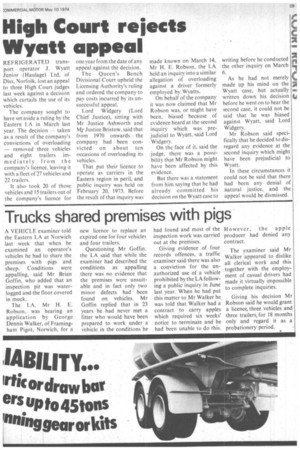High Court rejects Wyatt appeal
Page 31

If you've noticed an error in this article please click here to report it so we can fix it.
REFRIGERATED transport operator J. Wyatt Junior (Haulage) Ltd, of Diss, Norfolk, lost an appeal to three High Court judges last week against a decision which curtails the use of its vehicles.
The company sought to have set aside a ruling by the Eastern LA in March last year. The decision — taken as a result of the company's convictions of overloading — removed three vehicles and eight trailers immediately from the company's licence, leaving it with a fleet of 27 vehicles and 22 trailers.
It also took 20 of those vehicles and 15 trailers out of the company's licence for one year from the date of any appeal against the decision.
The Queen's Bench Divisional Court upheld the Licensing Authority's ruling and ordered the company to pay costs incuried by its unsuccessful appeal.
Lord Widgery (Lord Chief Justice), sitting with Mr Justice Ashworth and Mi Justice Bristow, said that from 1970 onwards the company had been convicted on about ten occasions of overloading its vehicles.
That put their licence to operate as carriers in the Eastern region in peril, and public inquiry was held on February 20, 1973. Before the result of that inquiry was made known on March 14, Mr H. E. Robson, the LA held an inquiry into a similar allegation of overloading against a driver formerly employed by Wyatts.
On behalf of the company it was now claimed that Mr Robson was, or might have been, biased because of evidence heard at the second inquiry which was prejudicial to Wyatt. said Lord Widgery.
On the face of it, said the judge, there was a possibility that Mr Robson might have been affected by this evidence.
But there was a statement from him saying that he had already committed his decision on the Wyatt case to writing before he conducted the other inquiry on March 6.
As he had not merely made up his mind on the Wyatt case, but actually written down his decision before he went on to hear the second case, it could not be said that he was biased against Wyatt, said Lord Widgery.
Mr Robson said specifically that he decided to disregard any evidence at the second inquiry which might have been prejudicial to Wyatt.
In these circumstances it could not be said that there had been any denial of natural justice, and the appeal would be dismissed.












































































































































































